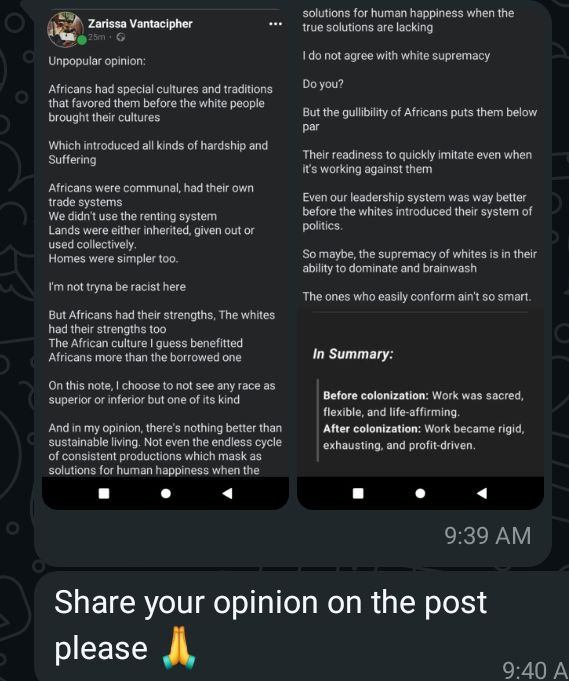Someone, a friend of mine sent this to me and asked for my opinion so I wrote this article.
I think the first correction this needs is that this isn't an unpopular opinion. I've seen variants of it in their various forms over the years I've spent in intellectual circles. The opinion that the African society was different and perhaps even fared better without the systems Europeans developed and introduced, and so needs either a reversion—a return to the systems of the past—or for we Africans to generate entirely new systems that are in tune with our "unique" cultures, which are underpinned by our very "unique" natures.
If I would be asked, I'd say I am more in support of the latter over the former, even though both might actually lead to the same outcomes, and are generated from what I would call very shaky priors:
1) Assumptions to the question of why civilization exists.
2) Assumptions to the question of just how unique our communal and familial cultures are.
3) Assumptions of what makes a civilization or culture better or good for a people.
I will treat all of these assumptions and priors one by one.
1) Why do civilizations exist?
It is hard to define a civilization but it is easy to tell when seen. It has its its characteristics and it has its aims. It's characteristics include a highly stratified culture, advanced technology, advanced commerce and means of communication. It's aim, just like all other societies by humans and non human beings have been for the exclusion and separation of man from the harsh, cruel, and survivalistic world of nature. The main point of civilization is that it separates man from harshness to comfort. But there lies a major problem. Comfort is the reason man wants to leave nature and its wildness, but it is also a very potent poison when finally achieved.
So far so good, man seems to be the only creature in want of civilization. As though ever since kicked out from paradise as the biblical fable goes, he became ever searching to create his own paradise, something to resemble that one place he was kicked out of. But is this true? Is it true that other animals don't search for comfort and want to amplify it to all possible ends?
The lion, when it gathers a pride around, to maximize hunt and protect a territory, does he have the face of man— of Adam? What is the aim of the pride if not to separate itself from the unpleasantries of the wild, to make all inconveniences less inconvenient, to make all dangers less potent? Was the lion thrown out of the Garden Of Eden too? Or what about the Ant and its hill? The Gazelle? The Chimp? Broadly all herd animals. What about them? It would seem whatever propels man to build a civilization exists in every living creature, however rudimentary it portrays and expresses itself.
Human civilization has manifested itself in many ways throughout the years, but for a great number of times, a certain form of it has appeared, and this form, in other to achieve it, in every single time, there has been need of slavery, the mass enslavement of people, to support an echelon of elites at the top who either just languish away in decadence or create high art or culture, free from the struggle of day to day life.
The empire, usually founded by strongmen who organized raids to conquer large swathes of land and people, putting them under their control, needs for its maintenance, law, architecture, engineering, maths, and even physics. These disciplines and fields are usually the ground on which most civilizations are built on. Those who have a weak foundation and grasp on these usually build less elegant edifices than those who do. The people who have these as occupations, are generally part of the elites. Revered and important.
A second important class are the guards and millitary class who safe guard the empire and make sure the law is being obeyed. They are almost as important as the above class.
The slaves and peasants are usually the class at the lowest end, but still much very occupy a much needed position. Without them doing the work, the elites would not be able to access high culture, and high fields like that of physics and maths would be impossible to pursue.
Civilizations generally need every individual to play their part, thus they birth social heirachies and roles that are expected to be played with the utmost seriousness.
Now, eyes on what I just stated above, is it remotely true that we have not had anything that resembles an empire without Western influence? If anybody would deny that then I would point to them the Benin Empire, the Oyo Empire, the Kingdom of Kush, Kanem Bornu, Ife, Ghana, Mali, etc.
The same fire that burns in the white man, the same force that pushes him to create comfort for himself, that makes him want to exclude the rest of nature, oppress his neighbors, kill and maim to create paradise; the same thing burns within us. The reasons we don't reach his level of complexity is the same reason the lions do not have an organization complexity that matches that of the Kalahari bush men. They would, if they could, but they couldn't, so they can't!
The description in the screenshot is of that of a communal African system usually found in villages. Sure that existed, but then the Benin Empire existed too. The Oyo as well. And the houses built for the Obas of both the Benin and Oyo empires were elegant. They were not small. For you to consider the village communal lifestyle of the average 14th century African as the only African style, and cutting off the elaborateness and greatness of the Benin and Oyo empires, because it is supposed to be so, makes it that you think Africans were only peasants. If you think so then their meeting with the Europeans was always destined to make them into slaves. This leads me to the second assumption on the list.
2) Our Communal cultures and familial customs are not all that unique.
They were not. Customs and cultures like that can be found almost every other place you look to in the world. Cultures where property isn't bought or sold but passed down within a family or community. More so it is perhaps a symptom of primitiveness, because it is a feature of most communes, perhaps the most primitive of societies. The first societies we had in the world were very communal, and I am sure there are really good reasons much of the world moved past it.
One of these reasons is that communes are hard to manage with a growing population. For this reason there are always very low in the number of people in them and while this is good for the system, there are easily defeated when they come in contact with greater human societies like the empire. This brings up something else I would like to point out. If the Europeans hadn't come, most of the so called communal villages that Afrocentrics praise as a better system would have been run down by some other growing empire with a thirst for power and control. The Benin, the Oyo empires, and the Fulani-Sokoto Caliphate in Nigeria, for example at the time were expanding pretty rapidly. One would have to be a blind resentful Afrocentric to ignore this.
3) What makes a Culture good?
A culture might be judged good by just how much comfort it serves its people. But comfort is illusory. Was it comfortable for the the 14th century African peasant to only have three major things to do in his day: farmwork, eating produce from his farm, and having bed visits to his wife or wives? Was that more comfortable than working in a shop, going to the local pub or bar, coming home to watch TV, under a fan or AC?
It would be if you judge the amount of work that was to be put into getting the first, in comparison with the amount of work to put in getting the second. This means that Africans would want the second, the European westernized style, if they had to put in less work. Personally I would pick being a freelance writer(what I do now)who gets money for writing for people over sweating above heaps of mud for mere sustenance food, but I guess when you're a resentful Afrocentric it becomes very easy to deny reality and say the first one is better because it was the ancestor's way of life.
The embarrassing truth is that we would have made a better more complex culture if we could because every being in existence wants infinite comfort. Long term comfort. Why does Africa struggle now in our new and advanced world of capitalism and western technology? Not because the Western influence is evil but because we lack geniuses.
A culture like that of the 14th century African peasant, optimized for the creation of specific kind of people. Peasants. Without Western medicine and aid, the population was generally steady due to the child mortality rate. Every child was only useful so far as they are able to till the soil, grow up to become warriors, and or women fertile enough to make more children with. It was a culture of stagnation. Afrocentrics who mouth praises to it are only worshipping backwardness, sterility, and mediocrity.
Even though one might argue that they'd pick working on a farm over working in an office, a factory, or selling in a shop, it is pretty much unlikely that they wouldn't want to boost the number of workers that would join them in the farm, or stop their wives and mothers from mourning their children's death every month, or possess superior fire power to keep away enemies and wild animals. Except the Afrocentrics are dishonest, which they usually are.
But what makes a culture good? I would say a culture is good so far that it doesn't cause for a cannibalization or end of its own self. All cultures, aim to spread, just as much as genes aim to spread. A culture is deemed successful when it is able to spread, and just as genes they are subjected to the principle of natural selection. Certain climes gives a culture an advantage over other cultures.
People who live close to the waterside will no doubt make a different culture from those who live in the mountains. The cultures evolve from certain necessities and will only prove to be deleterious when they don't provide the solutions to the problems for which there were created. To ascertain if the African Communal style was good, we would have to understand why they were created. The fact that we do not have records to even go back to and confirm what for the communal style was created, is a huge red flag. Because the lack of record keeping in a society often leads to misunderstandings and upheavals in a steady forward marching society, which generally the African Communal society was anything but. I guess when you have a sterile society, it becomes unnecessary for written records.
So if the praised African Communal system is hard to verify because it doesn't tell us of a reason it was maintained, due the absence of written records, hence no way to confirm if it worked, we can extrapolate from other communal systems why they were created in relation to the benefits they brought.
Over the years, Communal systems have been created as a direct opposition to so called capitalist and republican systems that stress individualism and competition. The bone of contention is the latter systems create inequality, needless suffering, and alienation of members of the community from theirselves. The Communal systems create more sense of community, oneness, and more solidarity etc. To what end were these needed and did they achieve it? Did they bolster the life expectancy and increase mortality rate? Did they create better abled people for the protection of the community? Did they better the food variability or nutrition of the community? Did they bolster economic growth? Technological innovations? Science and Art?
The problem with the Communal style of life is that it is a system that is only promulgated by people with a very weak ability for delayed gratification. It is a mediocre system that only deals with sustenance, not prolonged growth. And this is the reason it would always fail. Because it is not aimed at growth and development, for which we need the freedom and agency of brilliant individuals in the community to be committed to their interests, but just comfort for the present. This here is the one singular reason we as a people still fail.
The Europeans, the Asians, will not leave. They exist. Just as lions and their prey exist. If their systems are better than ours at optimization, and growth, we will only be eaten alive, over and over again. A culture that doesn't evolve to fit in with the times, is as good as dead. This is the law of natural selection. Reversion will not save us, because they will not leave us alone. They will continuously hunt us. The solution to our problems is a creation of new systems that optimizes for growth, and we should select those aspects of our cultures that are still useful for this, and as well still enables communal bond.
White Supremacism, as a term only serves for whistle blowing, which is only relevant in the present world order. It has no real meaning. What is bad about saying the Europeans have a better system than ours when our systems couldn't even succeed on the things it was supposed to? Tags like white Supremacism is only used to punish dissent of opinion, and any educated and intelligent person should know that is what it is for.








Do you think intelligence is a (strong) factor in why African systems do not improve and grow to achieve a better civilisation? Do you also think intelligence plays a part in influencing Africa's cultural heritage, which is passed from generation to generation? Or do they always have values in disharmony with growth?